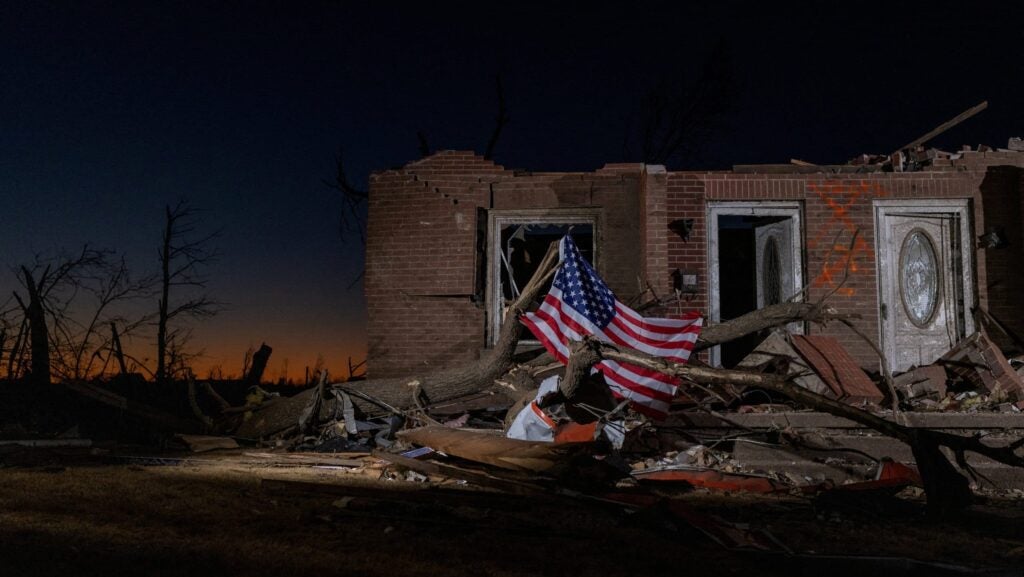
Kentucky director shares message of hope after community response to tornadoes

Deadly tornadoes left a more-than 200-mile path of destruction overnight on December 10, 2021, in the Midwest.
In the past month, Catholic Charities of the Diocese of Owensboro staff have been busy resettling 300 Afghan refugees in our community. We still have more than 150 refugees in an Owensboro hotel because of our housing shortage. Also, some landlords would not rent to the newcomers making placement even more difficult. Because they had no social security cards for a measly rental background check, the landlords would not process the refugees’ applications (they’re vetted much more than a Kentucky Office of the Courts database check). Over the month, I’ve written housing memos, started asylum and SIV cases, and fallen in love with our arrivals.
When the storms hit Dec. 10, I called the natural leader of the group of Afghans, Khaibar, and told him we would have to reschedule appointments. I communicated that I would have less availability and I would be devoting a lot of my time to the relief effort necessitated by the tornadoes. I asked if he could explain that to the other residents at the hotel.
His response floored me. He said, “Ms. Susan, I led a team for the International Red Cross in Afghanistan and Yemen. I’ve lead teams responding to landslides, earthquakes and floods. Give me a vest and put me to work. I can help. A lot of us can help.”
That was early Saturday morning. I knew then that Emmanuel was present in Khaibar’s response. The refugees had been through “hell” and wanted to assist their new neighbors. Since then, I have received many more messages from Afghans not yet in their own homes who want to assist.
I also see inspiration in my team helping to manage the many roles we need to fill. My paralegal and his family are without power and while their home wasn’t destroyed, they cannot stay in it. He wanted to help us in Mayfield, one of the hardest hit areas. He then came in early today to meet with my immigration appointments so I could devote time to disaster management. He is pitching in even while he is dealing with his own devastation.
Our Mass with the survivors of Mayfield on Sunday was beautiful. They gathered in a church — St. Joseph — that was not their own. It was both Gaudete Sunday AND the Feast of Our Lady of Guadalupe, and our Bishop was in attendance. He took a backseat to the parish priest. The church was packed with mostly Hispanic parishioners and the pastor gave the most beautiful homily I’ve ever heard. He wove the idea of rejoicing in the midst of darkness with Our Lady’s encounter and miracles with St. Juan Diego. Our Lady created beautiful flowers out of a barren, desolate mountaintop which is not unlike the opportunity we have here where everything has been destroyed. She converted millions with her miracle of love and we, as people of love and faith, can do the same.
After Mass, we went to a parish that was heavily damaged. They will be without electricity, running water and sewer services for at least 60 days. I witnessed one of my clients and a St. Joseph parish member organizing delivery of warm food, clothing and blankets. Since I had not seen him at Mass, I feared he was dead. When his eyes met mine, we hugged and cried. He told me how hard he was working to find people and get them supplies.
We were told none of the buildings in the parish were “usable” after the storms. It is on the edge of what we call the “war zone.” Yet here my client was, establishing a center for our outreach at the parish. One of the buildings will be our staging area for the residents of Mayfield.
Seeing my client, hearing the homily, and experiencing the reaction of my Afghan friend has opened my eyes to one big realization that I’ve repeated over and over to diocesan staff, including our Bishop, who have become temporary Catholic Charities workers: God is not in the “disaster,” but He is definitely in the response.
Susan Montalvo-Gesser, J.D., is director of Catholic Charities Diocese of Owensboro.








